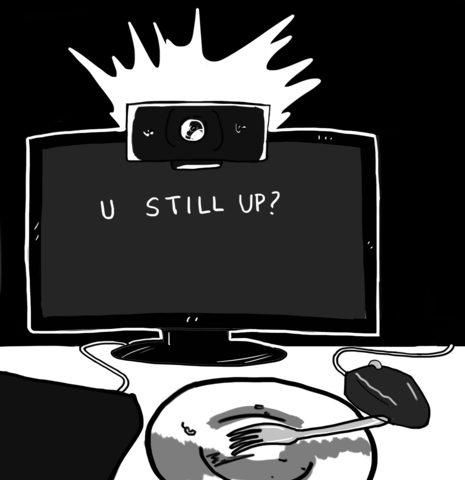One of the latest meme trends on the web are comical scenarios between Internet users and their personal FBI agents assigned to spy on them through webcams. These scenarios usually cast the FBI agent as a sympathetic, unlikely friend who watches the user suffer relationship failures, binge Netflix shows and waste time on the web instead of doing homework.
While comical, the normalization of federal law enforcement infringing upon citizens’ right to privacy is a dangerous precedent Americans should not be quick to accept.
The first thing to realize about these memes is they are not completely hypothetical situations; the government is most certainly spying on the American population without due process of law. The NSA debuted its PRISM surveillance program in 2007 after the passage of the Protect America Act and was further expanded under the FISA Amendment Acts of 2008. The latter act“specifically authorizes intelligence agencies to monitor the phone, email, and other communications of U.S. citizens for up to a week without obtaining a warrant” when one of the parties is outside the United States.
The NSA used this legislation to tap into the electronic devices of citizens without a warrant or even probable cause. The full scope of PRISM was unknown until whistleblower Edward Snowden leaked documents detailing NSA activities to The Washington Post and The Guardian in 2013. What was once regarded as crackpot conspiracy theories by paranoid shut-ins is now not so fictitious. And to assume the government and private corporations would not use this opportunity to wrongfully spy on individuals through their webcams is naive. Documents released by WikiLeaks as recently as Marchrevealed televisions, smartphones, cars, even anti-virus software were exploited by the CIA to spy on their users. And even without invasive hacking by the government, private companies like Facebook are also actively selling user information to the highest bidder. If Mark Zuckerberg has his webcam covered, so should you.
To understand the popularity and spread of your friendly neighborhood FBI agent meme, one must understand generational context. For young Millennials and members of Gen Z, individuals born in the mid-’90s and after, the idea of online privacy is somewhat mythical. With the PATRIOT Act’s passage in 2001, when most of Gen Z had yet to own their first cellphone, the government’s erosion of e-privacy was more status quo than a new threat to liberty. Add in the 2008 housing crisis and wars without an end in sight, it’s no surprise young people approach the future with a less optimistic lens, compared to their parents and grandparents.
This is where memes serve society. When the young demographic feels helpless in the face of growing inequality and injustice, the only solace remains in the comfort of relatable, humorous jokes on the Internet. FBI webcam memes are the prime example of using comedy as a mass coping mechanism against ongoing infringements which should not be happening in a land claiming to be for the people and by the people.
The most beneficial aspect of memes like the FBI agent in the webcam is starting a conversation with young people. Laughing on the Internet is all good fun, but there must come a time when we affirm that the context of this joke should not be normalized. There should never have been someone spying on us, regardless of the great meme content that stems from it. Gen Z should laugh, but they should also be angry. They should be angry enough to march in the streets and show up to the polls. They should be angry enough to question the government, especially when our rights are under siege in the name of “safety” or “security”. They should be angry enough to demand better or at least what the Bill of Rights entitles them to. Your personal FBI agent is not just a meme and is certainly not your friend. But they are a great reason to expect better for yourself.
– Zach Ienatsch is a journalism senior
Categories:
Your webcam FBI agent is more than just a meme
February 26, 2018

Illustration by Kennedy Swift | Staff Illustrator
0
Donate to The University Star
Your donation will support the student journalists of Texas State University. Your contribution will allow us to purchase equipment and cover our annual website hosting costs.
More to Discover





